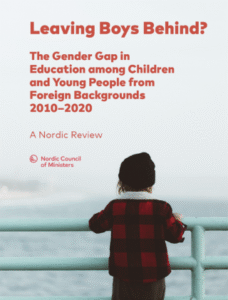New study from University of Helsinki: Boys of immigrant origin more likely to show symptoms of depression and anxiety
Integration, Barn och unga
2 sep 2025
In Finland, children and teenagers with an immigrant background are more likely to experience depression and anxiety than those from the majority population. A new doctoral thesis by Postdoctoral Researcher Rekar Abdulhamed at the University of Helsinki highlights both the risks these young people face and the key protective factors that can safeguard their mental health.
Higher risks, especially for boys
The study showed that children and teenagers from first-generation immigrant families are much more likely to experience depression and anxiety. While these gaps tend to narrow in the second generation, the differences were especially pronounced among boys.
Interestingly, having an immigrant background did not affect girls’ mental health in the same way. However, many young people of immigrant origin reported feelings of “double-loneliness”, being unable to share personal concerns either with parents or at school.
Many young people feel alone with their worries
According to Abdulhamed, children in immigrant families often adapt to Finnish culture faster than their parents. This cultural divide can make it difficult for them to confide in their parents about personal worries.
As a result, teachers and other trusted adults play a particularly important role. Yet many children still feel there is no one they can turn to for support. Schools are therefore key to the wellbeing of young people with an immigrant background. They are not only places to learn the language and culture, but also places where students can feel they belong. Abdulhamed’s research showed that support from teachers is a key factor in protecting young people’s mental health. This means treating students fairly, caring about their wellbeing, and encouraging them to share their opinions in class.
Feeling a strong sense of belonging at school, in hobbies, with friends, or in Finnish society, helped protect young people from the harmful effects of discrimination.
Supporting both schools and families
Finland’s teachers are highly skilled, but the study argues that more resources and cultural competence training are needed to meet the challenges of a diverse society. Parents, too, benefit from better understanding their children’s cross-cultural development.
“Above all, we must promote a sense of belonging and prevent discrimination and bullying,” Abdulhamed stresses. “It is crucial for Finland’s social cohesion that all children and adolescents of immigrant origin feel they belong in Finland and see themselves as Finns.”
Rekar Abdulhamed’s doctoral thesis, Mental Health Disparities Among Children and Adolescents of Immigrant Origin in Finland: Risks and Psychosocial Resources in Proximal Socioecological Contexts, was examined at the University of Helsinki on 22 May 2025.
Read the thesis here: Mental Health Disparities Among Children and Adolescents of Immigrant Origin in Finland : Risks and Psychosocial Resources in Proximal Socioecological Contexts
This report by The Nordic Council of Ministers could provide additional valuable insights:

